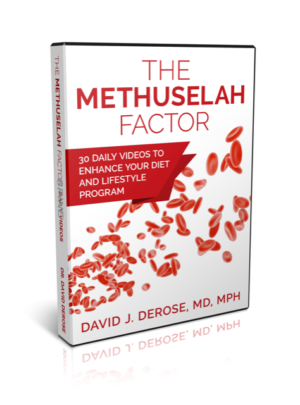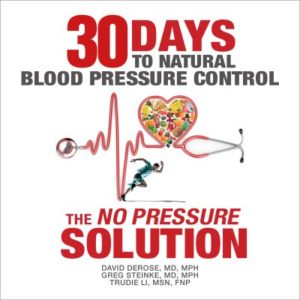Hypothyroidism: 20 Questions
David J. DeRose, MD, MPH
As presented on the Three Angels Broadcasting Network’s Health for a Lifetime
Taped December 2005
Note: This material is designed to inform and educate. It represents the opinions of the author based on his understanding of current medical research and is not intended to be viewed as a replacement for medical evaluation, advice, diagnosis, or treatment. Because medicine is a constantly changing science that requires professional evaluation, neither the author nor the distributors of this material can take responsibility for any adverse consequences resulting from the application of this information. If the material in this handout disagrees with personalized information provided by your health care professionals, please follow the counsel of those health care providers—not this article.
1. What exactly is hypothyroidism?
Hypothyroidism is a condition that occurs when the body has insufficient amounts of thyroid hormone. Lack of thyroid hormone can cause a range of problems depending on the degree of insufficiency. Some common symptoms and signs of hypothyroidism are listed in Table 1.
Table 1. Symptoms and Signs of Low Thyroid Function (Hypothyroidism)
| Fatigueu WeaknessConstipationSlow pulseSlow speechHoarsenessThickening of the tongue | Weight gainu Increased cholesterol and/or triglyceridesCold intoleranceDry, coarse skinBrittle, coarse hairHair loss (especially the outer third of the eyebrows) | Mental difficulties (poor memory, slowness in thinking)u Coordination problemsMuscle crampsJoint painCarpal tunnel syndrome (hand numbness, etc.) |
2. How common is hypothyroidism?
Clear-cut hypothyroidism occurs in roughly 2% of women and one tenth as many men (0.2%). We are more likely to develop this condition as we age. 6% of women and 2.5% of men over 60 have significant hypothyroidism.
3. Is my hypothyroidism reversible?
There are a variety of causes of hypothyroidism; some may be reversible, others generally are not. Table 2 indicates how frequently a variety of thyroid problems lead to permanent hypothyroidism. For example, painless thyroiditis renders only 6% of patients permanently hypothyroid. In other words, decreased thyroid function is reversible in 94% of those with this type of thyroid problem.
4. Can I be hypothyroid if my thyroid gland is normal?
The answer surprisingly is “yes.” This is because both the hypothalamus region of the brain and the pituitary gland (a “master” gland at the base of the brain) regulate thyroid function. Thus, problems with the hypothalamus or pituitary can lead to thyroid dysfunction. Such problems are uncommon—but not rare—causes of hypothyroidism. 90% of the time low thyroid function is due to problems with the thyroid itself.
Table 2. Causes of Hypothyroidism Related to the Thyroid Gland
| Name of Condition | Brief Description | Percentage Left With Permanent Hypothyroidism |
| Hashimoto’s thyroiditis | The most common cause of hypothyroidism in individuals older than 8 years old, it is an inflammatory disease of the thyroid characterized by antibodies against the gland. Early in the disease process affected individuals may be hyperthyroid (with elevated thyroid hormone levels and symptoms of rapid heart rate, weight loss, and sweating). | 100%; degree of hypothyroidism varies |
| Painful subacute thyroiditis | Inflammatory disease of the thyroid presumably triggered by a virus; often follows a respiratory illness. It is characterized by an exquisitely tender thyroid gland (the gland lies at the base of the neck just above the top of the breast bone). Hyperthyroidism often precedes hypothyroidism. | 10% of patients |
| Painless sporadic thyroiditis | Inflammatory disease of the thyroid; antibodies against the thyroid occur in 50-80% of affected individuals. | 6% of patients |
| Painless postpartum thyroiditis | A form of thyroid inflammation that occurs following pregnancy—also typically associated with antibodies to the thyroid. | 25-30% (i.e., reversible in 70%) |
| Suppurative thyroiditis | Rare inflammatory disease of the thyroid usually caused by bacterial infection. In addition to tenderness, affected individuals typically have fever, severe neck pain and redness of the skin overlying the thyroid area. | Close to 0% with prompt treatment |
| Riedel’s thyroiditis | Rare inflammatory disease of the thyroid of unknown cause, characterized by fibrous tissue infiltrating into the thyroid. Often presents as a slowly enlarging hard mass at the base of the neck, often mistaken for cancer. | Proportionate to the degree of fibrous infiltration |
| Previous hyperthyroid-ism treatment | Treatment with radioactive iodine or removal of most of the thyroid (“subtotal thyroidectomy”) destroys part of the thyroid and typically renders patients hypothyroid. | Typically 100% have some degree of hypothyroidism |
| Thyroid cancer treatment | Full treatment generally results in obliteration of all thyroid tissue and total dependence on an external source of thyroid replacement for life. | 100% |
| Iodine deficiency or excess | Iodine deficiency impairs thyroid production. Excess iodine intake may increase thyroid autoimmunity as well as suppressing thyroid hormone output. | Generally rever-sible, esp. with early diagnosis |
| Drugs | Many drugs affect thyroid function including: lithium, para-aminosalicylic acid, sulfonamides, phenylbutazone, amiodarone, and thiourea. Some (e.g. amiodarone) may trigger irreversible autoimmune processes. | Varying degrees of irreversibility |
| Congenital | Occurs in approximately 1 in 4000 live births. 85% due to largely irreversible thyroid developmental problems. | Well over 85% |
5. How is hypothyroidism diagnosed?
The single best test for hypothyroidism is called TSH (thyroid stimulating hormone). An elevated TSH level indicates hypothyroidism is present, stemming from a problem with the thyroid gland.
6. How can an elevated TSH indicate low thyroid hormone production?
Your pituitary gland helps regulate thyroid hormone production. Since it cannot audibly “speak” to your thyroid, it sends a hormone-messenger called TSH through your bloodstream. Consequently, if your thyroid gland is not producing enough thyroid hormone, your pituitary will begin to “call out more loudly” to your thyroid, telling it to work harder. The pituitary turns up the volume on its communication by increasing TSH production. Therefore, high levels of TSH mean the pituitary is saying there is insufficient thyroid hormone in your body.
7. How high does TSH have to be before I should be concerned?
Historically, we would not label someone as hypothyroid until their TSH was significantly above the normal range (greater than or equal to 10 mU/l) and blood levels of thyroid hormone (usually measured as either Free T4 or Free Thyroxine Index, FTI) were below the normal range. However, many experts now realize that thousands of people have “subclinical hypothyroidism.” In this case, the actual amount of thyroid hormone in the blood may test normal, but TSH is in the high normal range or just slightly elevated. Furthermore, some experts are suggesting that TSH levels above even 2 mU/l may indicate suboptimal thyroid function.
8. What are normal values for Free T4?
Normal free T4 levels are between 9 and 30 pmol/L (0.7 to 2.5 ng/dL). Free T3 is more biologically active; however, its levels are lower, normally ranging between 3 and 8 pmol/L (0.2 to 0.5 ng/dL).
9. How is hypothyroidism treated?
Most physicians treat overt hypothyroidism with L-thyroxine alone (known as T4). Brand names include Synthroid, Levothroid, and Levoxyl. A typical initial dosage is somewhere in the range of 25 to 100 micrograms (abbreviated mcg or ìg) per day. (Sometimes the dosage is reported in milligrams; 25 mcg is equivalent to .025 mg; 100 mcg = .10 mg). The starting dosage depends on how much residual thyroid function your treating physician judges is present.
10. I’ve been treated for thyroid cancer and my doctor says I have no thyroid producing capacity left. How much L-thyroxine should I be taking?
Regardless of the cause, young adults who lose all their thyroid capacity will generally require between 100–150 ìg/day. In the elderly, daily thyroid needs drop to 50–75 ìg/day. On the other hand, children and pregnant women often require higher levels of replacement. (The use of estrogens can further increase thyroid requirements.)
11. I’ve heard that T4 alone may not provide adequate replacement. Is this true?
The healthy thyroid gland makes two forms of thyroid hormone, T4 and T3 (triidoothyronine). Although many people do fine just taking T4, there is some evidence (albeit controversial) that adding some T3 may help a number of individuals. This may be most helpful in those who have had total removal or destruction of their thyroid; e.g. due to cancer treatment. Some doctors view the presence of mood or memory problems as an indication to add some T3 to the regimen.
12. Can my doctor simply substitute some T3 for T4?
No. T3 is about four times as potent as T4. If a person appears to be getting adequate thyroid replacement with T4 (i.e., TSH is stable), then a common approach is to decrease the T4 dosage by 50 mcg daily and add 12.5 mcg of T3 in its place.
13. My TSH is on the high side of normal, but I’ve been gaining weight and feeling fatigued. Would I benefit from taking thyroid hormone?
Your question brings into focus one of the more controversial thyroid issues, that of subclinical hypothyroidism. Most doctors will not diagnose the condition unless TSH is at least elevated above 5 mU/l (although T4 or free T4 levels are normal). However, even high normal levels of TSH may indicate early failure of the thyroid in some—but not all—individuals. The presence of antibodies against the thyroid gland provides evidence suggesting an autoimmune process, with the body beginning to attack the thyroid. In the case of high normal TSH along with thyroid antibodies, a minority of physicians advocate starting thyroid replacement. On the other hand, once TSH levels are above 5 mU/l, most physicians will begin thyroid replacement if either antibodies are present or the thyroid itself is enlarged (called “a goiter”).
14. My thyroid problems began after my last pregnancy. Since Table 2 indicates many such cases are reversible, can I stop my thyroid pill and see how well I do?
I never recommend abruptly stopping thyroid medication. If you developed thyroid problems following a viral illness or pregnancy and your doctor thinks your condition may be reversible, then he or she may recommend gradually tapering your dosage. We usually will not decrease daily thyroid replacement by more than 25 mcg at a time; some doctors will go slower, decreasing by 12.5 mcg or less. When the dosage is decreased, the patient is typically left at that level for weeks or months before decreasing the dosage further. The reason for this is that even if your thyroid has regained normal functional capacity, it has become dependent on prescription medication, and will not be able to abruptly increase its production of thyroid hormone.
15. I’m taking thyroid replacement therapy, should I avoid soy products and vegetables like broccoli and cabbage?
It’s true these foods have naturally occurring goitrogens (substances that interfere, to some extent, with thyroid function). However, these foods are also nutritional powerhouses, containing a variety of compounds with myriad health benefits including decreasing your risk of cancer and heart disease. Therefore, I usually feel uncomfortable telling people to avoid these foods. Especially if you already take a thyroid supplement and have a condition that is likely to be irreversible, avoidance of goitrogens is generally not in order.
16. My doctor says I have mild (subclinical) hypothyroidism. My TSH is 4.8; all my other thyroid tests are normal. My doctor says I could start taking low dose L-thyroxine. However, wouldn’t it be better to skip the medication and instead avoid soy and cruciferous vegetables?
It’s reasonable to consider dietary changes if you have mild or subclinical hypothyroidism. However, soy foods and vegetables like broccoli and cauliflower are not the foods that I’m most concerned about. If you really want to do yourself some good, try to decrease your exposure to man-made organic toxins. Dr. Theo Colburn recently reviewed data on a variety of common chemicals (like herbicides, pesticides, compounds used in plastics, etc.) and found that many impair either the production or activity of thyroid hormone.
17. How can I avoid these compounds that can adversely affect thyroid function?
I recommend “eating as low on the food chain as possible.” This means choosing plant products as much as possible. If you’re going to eat the flesh of an animal, bird, or fish, eat one that is only eating plant life—but even then, you may well be getting toxin exposures 5 to 10 times greater than eating the same amount of plant foods. The reason is that many of the worst toxins accumulate in the tissues of living creatures; the higher you go up the food chain, the more the toxins tend to accumulate. Ironically, therefore, when it comes to our thyroid, we may sometimes be better off drinking soy milk (containing some natural goitrogens) than cow’s milk (which may be contaminated with PCBs or other thyroid-impairing toxins).
18. I’m already a vegetarian, is there anything else I can do to avoid chemicals that may be affecting my thyroid?
Yes. Reassess your use of plastics for storing foods and beverages. Chemicals can leach out of plastic into the things we eat and drink. Heating things in plastic may be especially dangerous. For example, avoid using plastic or plastic wrap in microwaves. The best containers for storage and reheating appear to be those made of glass or other inert materials.
19. I’ve heard municipal water supplies (in addition to wells) can be contaminated with some of these compounds. Is this true?
Yes; frequent use of herbicides, pesticides, and other chemicals has tainted water supplies throughout much of our nation. To decrease exposure to these compounds, I recommend using a reverse osmosis system for the water you cook with or drink. You can also use a distiller—but it must be combined with a charcoal prefilter to effectively remove many organic compounds.
20. Can exercise affect thyroid function?
Physical activity generally improves metabolism, aiding in weight reduction, energy level, and bowel function. However, excessive exercise impairs thyroid function. Some research suggests sedentary people may often unwittingly impair thyroid function because their “moderate exercise” is too much for their out-of-shape body. Good exercise advice for your thyroid, therefore, includes “listening to your body” (slowing down when fatigued, etc.) and being wary of competitive activities where you may be tempted to overdo.
Selected References
• Bunevicius R, et al. Effects of thyroxine as compared with thyroxine plus triiodothyronine in patients with hypothyroidism. N Engl J Med. 1999 Feb 11;340(6):424-9.
• Colborn T. Neurodevelopment and endocrine disruption. Environ Health Perspect. 2004 Jun;112(9):944-9.
• Cooper DS. Combined T4 and T3 therapy–back to the drawing board. JAMA. 2003 Dec 10;290(22):3002-4.
• “Hypothyroidism” (Chapter 559) in Behrman: Nelson Textbook of Pediatrics, 17th ed., 2004 Elsevier.
• “Iodine and the synthesis and secretion of thyroid hormones” in Larsen: Williams Textbook of Endocrinology, 10th ed., Elsevier.2003.
• Lazarus JH. Thyroid disorders associated with pregnancy: etiology, diagnosis, and management. Treat Endocrinol. 2005;4(1):31-41.
• Pearce EN, et al. Effects of chronic iodine excess in a cohort of long-term American workers in West Africa. J Clin Endocrinol Metab. 2002 Dec;87(12):5499-502.
• “Thyroid Disorders” in Ferri: Practical Guide to the Care of the Medical Patient, 6th ed., 2004 Mosby, Inc.
• Weetman AP. Hypothyroidism: screening and subclinical disease. BMJ. 1997 Apr 19;314(7088):1175-8.




